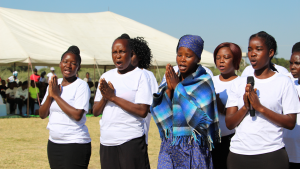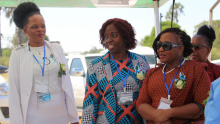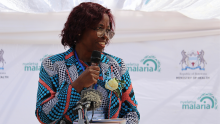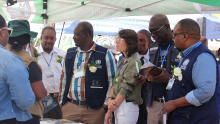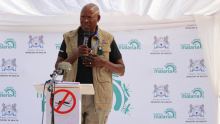Botswana commemorates the World Malaria Day 2023
Ministry of Health together with WHO Botswana, commemorated World Malaria Day in Maun on the 12th of May. This event catered to a diverse audience, including local malaria survivors who have received life-saving malaria treatment. To mark this occasion, the event emphasized the need to bolster malaria response across the country, especially in malarious districts such as Bobirwa, Palapye, Mahalapye, and Okavango where cases of malaria continue to be reported.
“As the Ministry of Health, it is our intention that in order to eliminate malaria, we strive to achieve universal coverage for appropriate preventative interventions for all populations at risk in all transmission areas,” Dr. Malebogo Kebabonye from the Ministry of Health said.
Botswana is part of a WHO-led global initiative - Malaria Elimination 2025 (E-2025) - comprising 27 countries earmarked for eliminating malaria by 2025. Under this initiative, Botswana has set a course in commitments and investments to reduce malaria cases to zero across the country. However, despite efforts towards eliminating the disease, cases continue to be reported in Botswana.
At the commemoration day were also present prominent members of local leadership, Kgosikgolo-Kgosi Tawana Moremi, Kgosi Totang Dingalo, Member of Parliament for Maun East, Honourable Gorititse Kekgonegile, the Deputy District Commissioner Ramogaupi Gaborekwe, and Village Development Committee Chairperson Baleseng Gwanga. During the event, they urged people to work towards following health regulations to stop malaria in Botswana.
Speaking at the event, WHO Country Representative Dr. Josephine Namboze emphasized that to reverse malaria cases and accelerate progress according to this year’s World Malaria Day theme and objective, there is a need to rethink and revitalize the strategy by investing, innovating, and implementing smartly. “We can now save millions of lives each year from sickness and death caused by malaria following novel progress toward the disease’s elimination.” Dr. Namboze continued.
Invest
It is important to increase funding for malaria interventions through primary healthcare approaches so that malaria services are accessed by everyone especially the most vulnerable populations wherever they are. In 2021, endemic countries and partners mobilized only 50 percent of the estimated USD 7.3 billion required globally to stay on track to defeat malaria, according to WHO. Therefore, it is even more important that MOH-Botswana keeps malaria high on its agenda as it allocates resources to the health sector.
Innovate
There is a great need to increase the number and efficacy of control tools as well as strategies to allow greater impact of interventions. In this light, WHO recently prequalified new dual active ingredient insecticide-treated nets and several insecticides for indoor residual spraying. The new RTS,S vaccine deployment has been extended beyond the three initial countries and several other innovative products towards ending malaria are in the pipeline. New tools and strategies are needed to address the threats of drug resistance, insecticide resistance, and new invasive vectors compromising gains in vector control. In this regard, WHO launched two strategies to support countries in the African continent as they work to build a more resilient response to malaria: (1) a strategy to curb antimalarial drug resistance and (2) an initiative to stop the spread of the new invasive Anopheles stephensi malaria vector – a dangerous vector that breeds in urban areas and has the potential of increasing transmission.
Fighting against malaria vectors will require multisectoral actions between the Ministry of Health and WHO and the involvement of decentralized administrative units and communities to sustain behavioral change and uptake of these tools. Moreover, innovation must be a cornerstone to ensure a progressive response plan toward the goal to end malaria in Botswana.
Implement
As an overarching arm of any disease response, the implementation aids in the planning and the target population of the response. As such, implementing malaria response programmes must be geared towards providing accessible malaria prevention tools for the people of Botswana, especially marginalized areas. Furthermore, malaria programmes should be decentralized to the district and community levels where health systems are closest to the affected populations. To ensure accessibility, frontline health workers and communities must be empowered to participate fully in identifying key barriers to accessing services, ensuring effective implementation of malaria control strategies as well as the capacity to hold their leaders accountable for health outcomes.
“To get us started in the development and implementation of the accelerated and robust plan towards elimination targets for Botswana, I have brought in here a team of malaria experts from all the levels of WHO,” continued Dr. Namboze during the commemoration.
Through intensified case-based surveillance, accessible diagnostics, treatment services, and coverage of preventative measures, Botswana has made a lot of strides toward lowering malaria incidence in the country. To date, many people are testament to receiving lifesaving malaria prevention and response. However, according to the Malaria Elimination 2025 guidelines, Botswana needs to strengthen its malaria elimination initiatives as the disease is preventable and treatable, therefore any related death is unacceptable. This year calls on Botswana to not only continue its current malaria elimination initiatives but to further strengthen these initiatives through more investments, innovations, and effective implementations.



